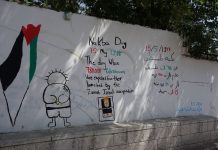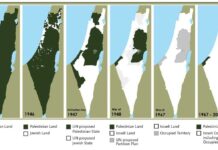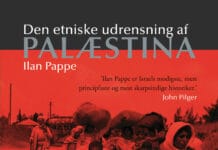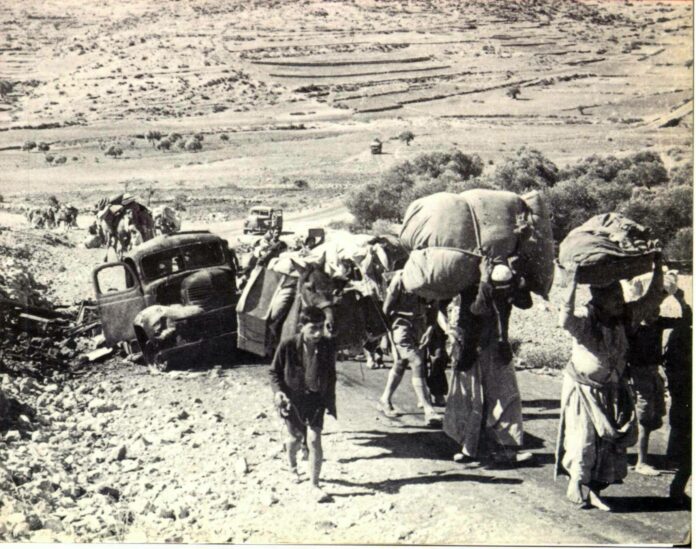
14. maj 1948 angreb zionisterne palæstinensiske områder og byer og staten Israels blev dannet. 15. maj er sørgedag for palæstinenserne, der mindes Nakbaen (al-Nakba), hvor omkring 750.000 palæstinensere blev fordrevet fra deres landsbyer og jord.
Indhold
På dansk
In English
Appendix: Ilan Pappe og bogen ‘Den etniske udrensning af Palæstina’
Forord
14. maj 2008 fejrede Israel 60-året for staten Israels dannelse i 1948, og 15. maj er sørgedag for palæstinenserne. På denne dag mindes de Nakbaen (al-Nakba), hvor omkring 750.000 palæstinensere blev fordrevet fra deres landsbyer og jord. Den israelske version var i en årrække, at palæstinenserne flygtede af egen fri vilje, mens palæstinenske historikere, og fra slutningen af 1980erne også en række ‘revisioniske’ israelske historikere, dokumenterede, at palæstinenserne var ofre for en velplanlagt etnisk udrensning. I den anledning har vi samlet en række artikler, bøger og sites med debat og dokumentation om fordrivelsen af palæstinenserne i 1948.
Påbegyndt 25. april 2008, revideret maj 2023.
Se også på Socialistisk Bibliotek:
- Emneoversigten Palæstina / Israel
- Emnelisten Zionisme – Antizionisme: Historien om racisme og etnisk fordrivelse
o0o
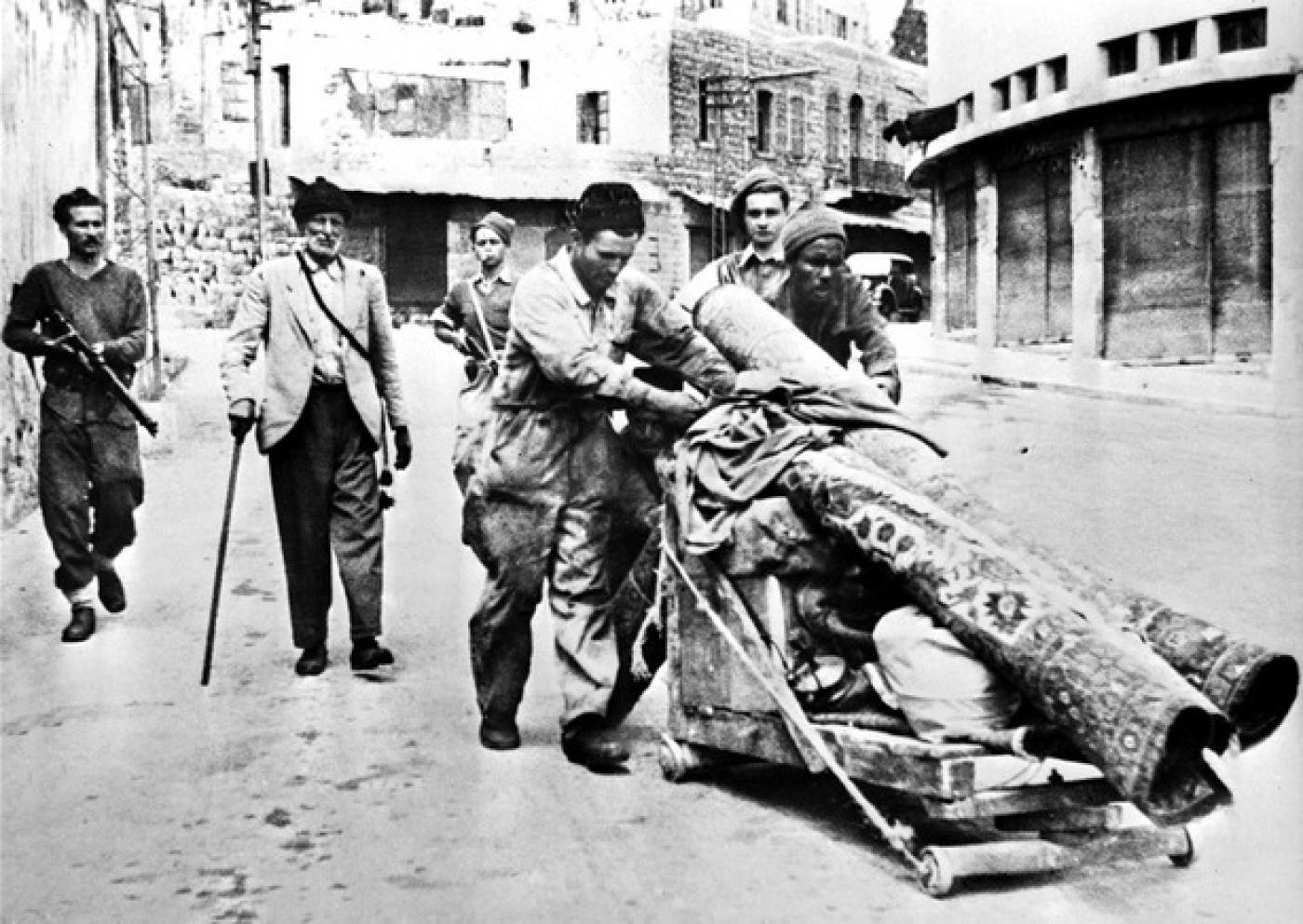
På dansk
Artikler
Arbejderen
Da et folk blev fordrevet (12. maj 2018, s.2-3)
“Omkring og lige efter 1948 begik zionistiske terrorgrupper 70 massakrer på palæstinenserne. Opskræmte palæstinensere i hundredetusindvis søgte tilflugt i flygtningelejre på Vestbredden, i Gaza og i de nærliggende arabiske lande.”
Autonom Infoservice
Dansk Palæstinensisk Venskabsforening
Christian Ulstrup og Lars Plough: En historisk strid – en strid om historien: baggrunden for det palæstinensiske flygtningespørgsmål (2. marts 1998; online på Internet Archive)
Behandler fordrivelsen af 700.000 palæstinensere i 1948, på baggrund af de nye historikeres opdagelser. Artiklen er udarbejdet i forbindelse med konferencen: Palæstinensiske flygtninges ret til at vende hjem, afholdt i København april 1998 af Dansk-Palæstinensisk Venskabsforening i samarbejde med FN-forbundet, Folkekirkens Nødhjælp og Mellemfolkeligt Samvirke.
Information
Göran Rosenberg: I Tantura ligger smertens grænse (15. juni 2002)
“En israelsk massakre på en arabisk landsby i 1948 kræver stadig ofre – historieskriverne.”
Pia Fris Laneth: Kamp om fortiden (16. maj 2002)
“Et universitetsspeciale om massakren på en arabisk landsby i 1948 er endt i retten. Historikeren Ilan Pappé er ved at blive fyret fra Haifa Universitet. Israelerne slås om fortiden.”
Kritisk Debat
Morten Thing: Fra pogrom til Nakba – 70 år siden Katastrofen (16. april 2018). P.t. ikke online.
“Ud af en arabisk befolkning på 1,2 millioner blev altså mere end halvdelen fordrevet. Den jord og de huse, de forlod, blev israelsk ejendom.”
Modkraft.dk
Lars Ploug: Israel-apologeter mellem skam og racisme (Kontradoxa, 3. oktober 2005)
“Fordrivelsen af palæstinenserne i dilemmaet mellem fornægtelse og forsvar.”
Tikva Honig Parnass: Israelsk selvransagelse om begivenhederne i 1948 (2002)
“Begivenhederne i 1948 er helt afgørende i forståelsen af Palæstina-konflikten. Set fra det officielle Israels side er det jubelåret, hvor drømmen om en jødisk stat blev til virkelighed. Set fra palæstinernes synspunkt er det katastrofens år, hvor flertallet blev reduceret til flygtninge.”
Bjørn Meidell: Flugten fra Palæstina
“I sin artikel lader Bjørn Meidell Aisha og hendes mand fortælle historien om deres egen skæbne, Israels etniske udrensning af palæstinensere i 1948-49 og deres håb om fremtiden.”
Mahmoud Issa: Masseflugten i 1948: kerneproblemet i den palæstinensiske katastrofe (2001)
“En mængde dokumenteret materiale vedrørende de væsentlige begivenheder i al-Nakba (katastrofen), er blevet publiceret, særligt af de nye israelske historikere som f.eks. Benny Morris, Avi Shlaim og Ilan Pappe. Ikke desto mindre er der brug for en større fokusering på sagens historiske rødder og på, hvordan det kunne gå til, at 2/3 af palæstinenserne blev rykket op med rode i en af de største etniske udrensninger efter den Anden Verdenskrig, en begivenhed hvis rædsler overgår det, der skete 50 år senere i Bosnien, Hercegovina og Kosovo.”
Amnon Kapeliouk: Israels ønskedrøm – et land uden arabere (1987)
“I Israel og den vestlige verden var det i årtier en grundfæstet opfattelse, at palæstinenserne og de arabiske nabostater bærer hovedansvaret for flygtningeproblemets opståen i 1948-49 og for den vedvarende tilstand af konflikt og krig i Mellemøsten. Men fra midten af 1980’erne begyndte der så småt at komme sprækker i denne opfattelse. Også i Israel.”
Palæstina-Orientering
Christian Ulstrup: Transfer: en integreret det af den zionistiske ide (nr.4, 1997, s.20-29)
“Artiklen gennemgår den zionistiske bevægelses diskussioner og tiltag før 1947 om fjernelsen (d.v.s. fordrivelsen) af den indfødte palæstinensiske befolkning med henblik på oprettelsen af en jødisk stat i Palæstina.”
Christian Ulstrup: Oktober 1948 (nr.2, 1997, s.3-7)
“I de seneste år har israelske historikere kastet nyt lys over begivenhederne omkring staten Israels oprettelse og om baggrunden for det palæstinensiske flygtningeproblem. Her har ikke mindst Ilan Pappé og Benny Morris.”
Christian Ulstrup: De nye historikere (nr.3, 1996, s.3-6)
“I den sidste halve snes år er der fremstået en række nye historikere i Israel med et nyt syn på Israels historie, der bryder med den officielle historieforståelse. Hvilken rolle spiller disse i det israelske samfund og repræsenterer de et virkeligt nybrud.”
Socialistisk Arbejderavis
Israel – grundlagt på terrorisme (nr.279, 12. juni 2008)
“60 år efter at palæstinenserne blev fordrevet undersøger Anne Alexander og John Rose den israelske stats oprindelse.”
Israel: Grundlagt på etnisk udrensning (nr.258, 16. august 2006)
“Den anerkendte anti-zionistiske historiker Ilan Pappe skriver om Israel og historien om landets ødelæggende rolle i Mellemøsten.”
Socialistisk Information
Alice Speri: Tantura – massakren på en palæstinensisk landsby i 1948 (6. december 2022) “Den israelske dokumentarfilm Tantura udfordrer den officielle myte om statens grundlæggelse og fordrivelsen af palæstinenserne. Den er et resultat af mere end to års research og interviews med de overlevende kvinder og mænd fra Alexandroni-brigaden. Om begivenheder, de fleste af dem aldrig har talt om, og som mange af dem en gang rent ud benægtede er sket.”
Solidaritet
Kenneth Haar: Massakren og den israelske selvopfattelse (6. august 2023)
“Indbyggerne var flygtet i deres fiskerbåde” skrev Herbert Pundik om sine oplevelser som ung soldat for Israel i en landsby i Palæstina i 1948. Dokumentarfilmen ‘Tantura’ fortæller en helt anden historie.”
Nakbah – den palæstinensiske katastrofe 75 år efter (18. april 2023)
“Fire vidnesbyrd om den palæstinensiske fordrivelse – Bjørn Meidell, der har besøgt og skrevet bøger om Israel og Palæstina i flere årtier, har sammensat en mosaik om israelernes fordrivelse af 750.000 palæstinensere i 1948.”
Christian Ulstrup: Transfer: et nationalistisk krav (nr.5, december 2001, s.28-32; online på Internet Archive)
“Transfer, der oversat til dansk betyder noget i retning af ‘overflytning’ eller ‘forflytning’, har lige siden den politiske zionismes fødsel i slutningen af 1800-tallet været en integreret del af zionismen.”
Videnskab.dk
Radio/Podcast:
Den2radio:
Vi vender tilbage. 70 år efter ‘Katastrofen’ (19.- 25. maj 2018, 27 min.)
“… baseret på lydoptagelser fra en antropologisk feltarbejdsøvelse i det nordlige Israel udført af Sally Kamille Liversage, Betty Lydolph Laursen og Mads Bjørn Lundsgaard.”
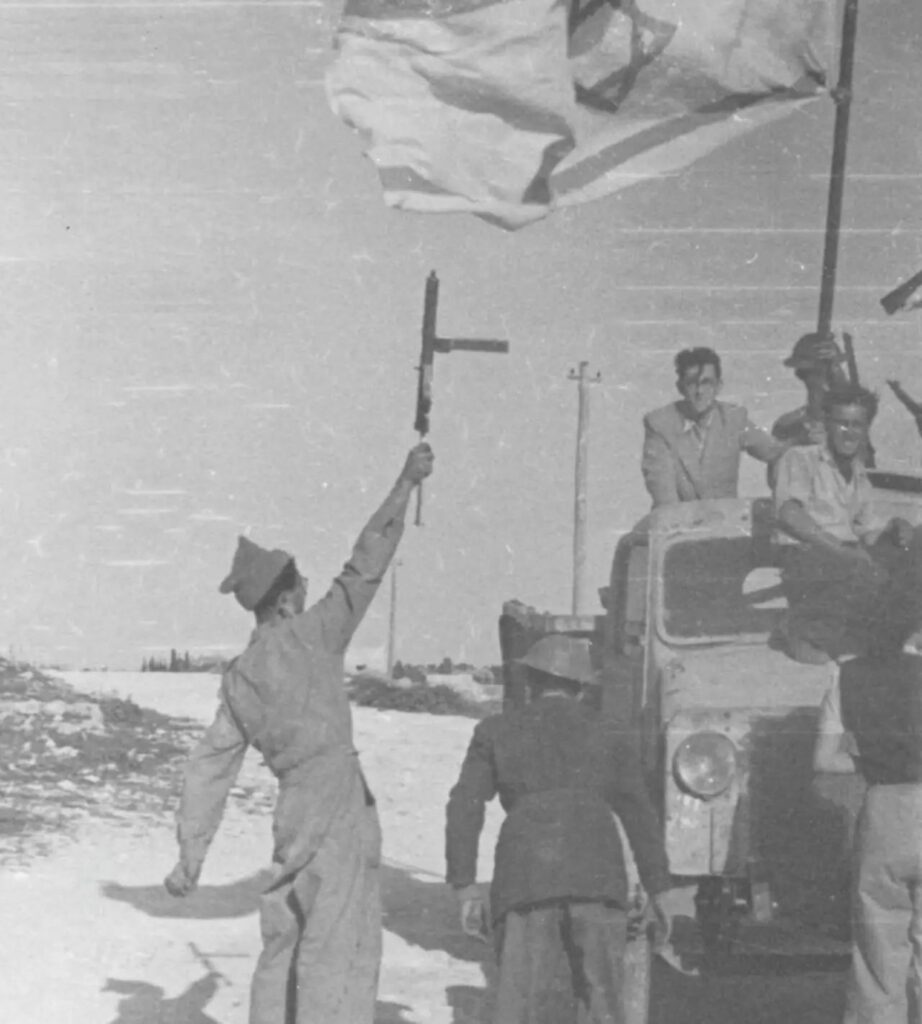
Sites
Dansk Palæstinensisk Venskabsforening
“Sitet har aktuelle indlæg samt baggrundsoplysninger med henvisning til aftaler, konventioner og historiske dokumenter (fortrinsvis engelsksprogede). Desuden afsnit med fakta og aktiviteter. Links til videre søgning.”
Palæstina-Info
“Formålet med Palæstina-Info er at tilvejebringe et redskab, som kan bruges af offentligheden og i undervisningssektoren – fra gymnasieskolen & HF og opefter. Dels med henblik på at forstå baggrunden for den hundredårige konflikt om Palæstina, dels forstå omstændighederne omkring den endeløse besættelse af Østjerusalem, Vestbredden og Gaza, samt flygtningespørgsmålet.”
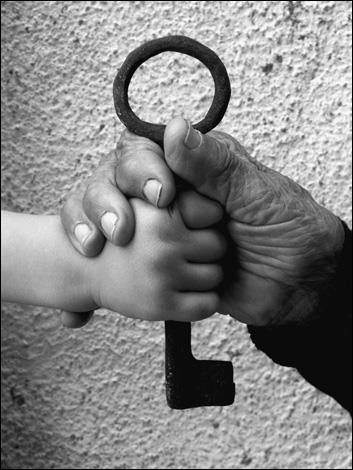
Bøger
Dansk Palæstinensisk Venskabsforening
Litteratur om Palæstinakonflikten
Den etniske udrensning af Palæstina
Af Ilan Pappe (Klim, 2012, 329 sider)
“Den fremtrædende israelske historiker Ilan Pappe arbejder for international anerkendelse af denne tragedie. Hans banebrydende og kontroversielle bog kaster nyt lys over den palæstinensisk-israelske konflikts oprindelse og udvikling.”
Se linkboxen: Ilan Pappe og bogen Den etniske udrensning af Palæstina (Socialistisk Bibliotek).
Israels erobring af Palæstina: fra Rishon LeZion til Ariel
Af Carsten Skovgaard Jensen (Aalborg Universitetsforlag, 2007, 525 sider)
“Bogen er et opgør med den officielle historieforskning i Israel. Den forholder sig kritisk til en række sejlivede myter omkring zionismen og staten Israels forhold til palæstinenserne.”
Lubya var en by i Palæstina
Af Mahmoud Issa (Tiderne Skifter, 2005, 274 sider)
“Gennem hundredvis af samtaler med eksilerede indbyggere fra Lubya og deres efterkommere – og gennem omfattende studier i historiske arkiver og dokumenter – har Mahmoud Issa i denne bog, som også udgives på arabisk, hebraisk og engelsk, foretaget en personlig rejse tilbage til fortiden og livet i Lubya før og efter den etniske udrensning. Bogens kombination af makrohistorie og mundtlige beretninger (mikrohistorie) afdækker den etniske udrensnings brutale ansigt i 1948.”
Se også Mahmoud Issa: Masseflugten i 1948 – kerneproblemet i den palæstinensiske katastrofe (Palæstina-Info)
Kaktussens land: en rejse i selvbedrag: 100 års kamp om Palæstina
Af Carlo Hansen (Klim, 2002, 288 sider)
“Den erfarne journalist, Carlo Hansen, fortæller nøgternt og vidende om vilkårene i de palæstinensiske flygtningelejre, om overgrebene og de ufattelige lidelser, men ikke mindst om historien bag landflygtigheden.”
En stat for enhver pris: konflikten i Mellemøsten
Af Birgitte Rahbek (Fremad, 2000, 407 sider)
“Bogen handler om kampen for og om Palæstina fra konfliktens begyndelse til den aktuelle situation.”
Anmeldelse: Dyr fred. Af Charlotte Aagaard (Information, 13. september 2000)
Det tabte land: en personlig historie
Af Göran Rosenberg (Forlaget Tiderne Skifter, 1998/2001, 494 sider)
“I en personlig essayistisk beretning skildrer forfatteren vor civilisations største og mest gennemgribende utopi: Det forjættede land, Messiasriget, Sion, Israel. Bogens titel – Det tabte land – giver et fingerpeg om, hvor hans rejse til slut har bragt ham hen.”
Se interview med forfatteren: Forjættede land farvel (Information, 20. marts 1998)
Anmeldelse: Israel – 50 år som USA’s vagthund. Af Margit Johansen (Socialistisk Revy nr. 5, juni/juli 1998, s.10)
Zionismens Israel: et land i evig krig
Af Kit Broholm og Anne Grethe Holmsgård (Historisk Revy, 1984, 236 sider)
“Bogen er en grundig og lettilgængelig fremstilling af den historiske baggrund for og myterne omkring den nuværende konflikt. Den giver en materialistisk forklaring på årsagerne til antisemitismen i de førkapitalistiske samfund, og dokumenterer at den zionistiske bevægelse ikke opstod som en ‘befrielsesbevægelse’, men tværtimod som en reaktionær og proimperialistisk bevægelse …”
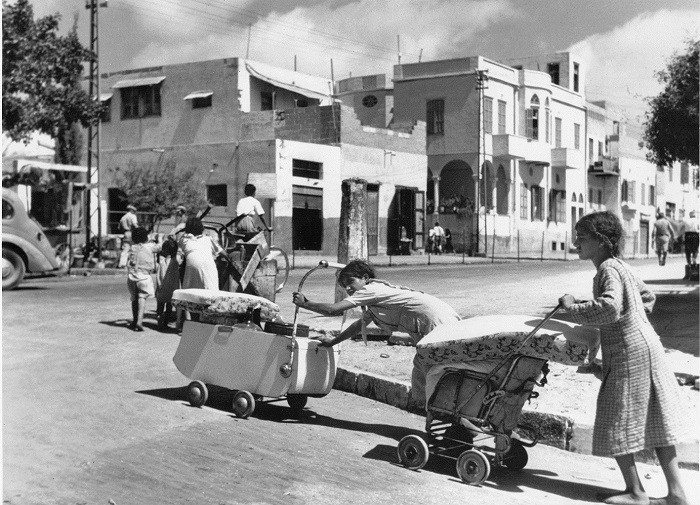
In English
Articles
Against the Current
Norman Finkelstein: Palestine: The truth about 1948 (Issue 15, July/August 1988). Review of Simha Flapan’s The Birth of Israel: Myths and Realities (Pantheon Books, 1987)
“In some 250 densely argued pages, Flapan, former national secretary of Israel’s Mapam party, demolishes the version of Israel’s genesis enshrined in past scholarship and the popular media.”
Al Ahram Weekly Online
Ilan Pappé: Demons of the Nakbah (Issue 586, 16-22 May, 2002)
“Israel has long denied its responsibility for the events of 1948, the Nakbah, that forced the Palestinian population from Palestine at the point of Israeli guns. However, today when recognition of the wrongs done to the Palestinians in 1948 is finally dawning, many Israeli politicians are openly advocating a new ‘Transfer Option’.”
Counterfire
Laura Woods: Khirbet Khizeh – A story from Israel’s ethnic cleansing of Palestine (April 1, 2011). Review of S. Yizhar’s book (Granta, 2011, 128 p.)
“The first English translation of the classic novel of the Nakba, Khirbet Khizeh, has just been published by Granta. It is a powerful story of the real cost of the creation of the state of Israel.” Dansk udgave: Khirbet Khizeh – Slagmark (Møller, 2016, 130 s.).
See also series: Nakbha75: the roots of Israeli apartheid (March-May 2023).
CounterPunch
Khalil Nakhleh: Al Nakba of 1948 (March 21, 2008)
“What is important, from my perspective as a Palestinian, is that there is a need to understand what happened to us in and around 1948; and why it happened the way it did; and what should we do to circumvent Al-Nakba from persisting into our future.”
The Electronic Intifada
Joseph Massad: The future of the Nakba (13 May 2018)
“Zionist settler-colonialism, which finally rid itself of its British colonial sponsor in 1948 and established the settler-colonial state, has never ceased to worry about the possible future reversal of the Nakba.”
Haaretz
Hagar Shezaf: Burying the Nakba: How Israel systematically hides evidence of 1948 expulsion of Arabs (July 5, 2019)
“Since early last decade, Defense Ministry teams have scoured local archives and removed troves of historic documents to conceal proof of the Nakba.” See the document in translation (pdf, 29 p.).
Ofer Aderet: Testimonies From the Censored Deir Yassin Massacre: ‘They Piled Bodies and Burned Them’ (A young fellow tied to a tree and set on fire. A woman and an old man shot in back. Girls lined up against a wall and shot with a submachine gun. The testimonies collected by filmmaker Neta Shoshani about the massacre in Deir Yassin are difficult to process even 70 years after the fact.
International Journal of Middle East Studies
Avi Shlaim: The debate about 1948 (Vol.27, No.3, 1995, p.287-304)
“Until recently the standard Zionist version of the events surrounding the birth of the State of Israel remained largely unchallenged outside the Arab world. The fortieth anniversary of the birth of the state, however, witnessed the publication of a number of books which challenged various aspects of the standard Zionist version.”
Jacobin
Suyin Haynes: These stunning images show Palestinian life before the Nakba (April 10, 2024)
“Zionist propaganda refers to pre-1948 Palestine as a ‘land without a people’. A new photographic collection pushes back against this erasure of Palestinian history — and shows the vitality of its society before the Nakba.”
Jews for Justice in the Middle East
The Origin of the Palestinian-Israeli Conflict (2001)
“This paper outlines the history of Palestine to show how this process occurred and what a moral solution to the region’s problems should consist of.”
Jewish Voice for Peace
Nakba Fact Sheet (pdf) (2005, 4 p.)
“Knowing the histories that made Israel a state and Palestinians dispossessed is critical to establishing a just and lasting peace that can truly be agreed upon by Palestinians and Israelis.”
Journal of Palestine Studies
Walid Khalidi: Plan Dalet: Master plan for the conquest of Palestine (pdf) (Vol.18, No.1, Autumn 1988, p.4-33)
“Some twenty-five years ago Professor Walid Khalidi published his article Plan Dalet: Master plan for the conquest of Palestine (Middle East Forum, July 1959). On the occasion of the fortieth anniversary of the Palestine exodus, we asked him to take a second look at the article.”
Walid Khalidi: Why did the Palestinians leave, revisited (pdf) (Vol.32, No.2, Winter 2005, p.42-54)
“Reprint for the first time of a difficult-to-obtain article published in July 1959 … A general theme running through the Zionist account of the events between 1947 and 1948 is that orders were broadcast to the Arabs to leave the country in order to pave the way for entry of the regular Arab armies.”
Joel Beinin: Forgetfulness for memory: The limits of the new Israeli history (Vol.34, No.2, Winter 2005, p.6-23). Only abstract online.
“Many believe that the ‘new historians’ represent a revolution in Israeli intellectual life. However, the exclusion of Arab voices and sources of evidence, especially in the work of Benny Morris, limited the extent of that revolution and situates some of the new history close to traditional Zionist categories of knowledge.”
Norman Finkelstein: Myths, old and new (pdf) (Vol.21, No.1, Autumn 1991, p.66-89)
“In this essay I want to focus on the work of Benny Morris, a former diplomatic correspondent of the Jerusalem Post who received his doctorate from Cambridge University. Morris is the most influential and prolific of the ‘new’ historians.”
Norman Finkelstein: Rejoinder to Benny Morris (Vol.21, No.2, Winter 1992, p.61-71). Only first page online.
Walid Khalidi: Plan Dalet: Master plan for the conquest of Palestine (pdf) (Journal of Palestine Studies, Vol.18, No.1, Autumn 1988, p.4-33)
“‘Plan Dalet’ or ‘Plan D’ was the name given by the Zionist High Command to the general plan for military operations within the framework of which the Zionists launched successive offensives in April and early May 1948 in various parts of Palestine.”
The Link
Ilan Pappe: What really happened 50 years ago? (pdf) (Vol.31, No.1, January-March, 1998; online at Internet Archive)
“This issue’s feature article by Ilan Pappe, an historian at Haifa University, challenges Israel’s official account of what happened 50 years ago in Palestine. Dr. Pappe is one of a growing number of Israeli historians whose analyses of newly released documents by the U. S., England and Israel have led them to conclude that what really happened back then is far closer to what Palestinians have been saying all along.”
The Middle East Research and Information Project (MERIP)
Joel Beinin and Lisa Hajjar: Palestine, Israel and the Arab-Israeli conflict: A primer (February 2014)
Theme: Who paid the price: 50 years of Israel (Issue 207, Summer 1998). “Middle East Report looks at the legacies of the creation of the state of Israel as it turned 50.”
Le Monde Diplomatique
Dominique Vidal: The expulsion of the Palestinians re-examined: Ten years of research into the 1947-49 war (December 1997)
“Israel has always denied that [the Palestinians] were expelled, either forcibly or as a matter of policy. Israel’s new historians have been re-examining that denial and have put an end to a number of myths.”
The Official Website of Ilan Pappé
The ethnic cleansing of Palestine (3 October 2006)
“Interview with Ilan Pappe at ZNet about his new book.”
The history of Israel reconsidered: A Talk (March 8, 2006)
“On March 8, he spoke at a small colloquium in Tokyo organized by the NIHU Program Islamic Area Studies, University of Tokyo Unit, on the path of personal experiences that brought him to write his new book.”
The ’48 Nakba & The Zionist quest for its completion (October 2002)
“This article is based upon the transcript of a lecture presented by Dr. Pappe to the Right To Return Coalition – Al Awda UK , held at the School for Oriental and African Studies in London.”
Demons of the Nakbah (16-22 May 2002)
“Israel has long denied its responsibility for the events of 1948, the Nakbah , that forced the Palestinian population from Palestine at the point of Israeli guns. However, today when recognition of the wrongs done to the Palestinians in 1948 is finally dawning, many Israeli politicians are openly advocating a new ‘Transfer Option’.”
OpenDemocracy
Avi Shlaim: Israel’s “new history” and the Palestinians (4 November 2009)
“A rethinking by Israeli historians enlarges understanding of the bitter events of 1948, including the Palestinian “nakba” (catastrophe). It thus creates a foundation for addressing their consequences in the present.”
RS21: Revolutionary Socialism in the 21st Century
Village by village, town by town – how Zionists tried to destroy Palestine in 1948 (November 11, 2014)
“In the sixth and final part of his series on Zionism, imperialism and the Palestinians, Neil Rogall describes the Nakba – the establishment of the Israeli state and catastrophe for Palestine.” With links to Part 1-5 in the series.
Socialist Worker (UK)
The Nakba shows why it’s right to oppose Israel (Issue 2603, 8 May 2018)
“Supporters of Israel try to deny its brutal history and attack critics of the state as antisemitic. On the 70th anniversary of the Nakba, when Palestinians were driven from their land, Nick Clark explains why it’s right to show solidarity with Zionism’s victims.”
Israel – created by terrorism (Issue 2101, 13 May 2008)
“Sixty years since the Palestinians were expelled, Anne Alexander and John Rose examine the roots of the Israeli state.”
Ilan Pappe on how Israel was founded on ethnic cleansing (Issue 2011, 29 July 2006)
“Acclaimed anti-Zionist historian Ilan Pappe on Israel and the history of it’s destructive role in the Middle East.”
The Spectator
Erskine Childers: The other Exodus (May 12, 1961)
“Israel claims that the Arabs left because they were ordered to … Examining every official Israeli statement about the Arab exodus, I was struck by the fact that no primary evidence of evacuation orders was ever produced. The charge, Israel claimed, was ‘documented’; but where were the documents? There had allegedly been Arab radio broadcasts ordering the evacuation; but no dates”ž names of stations, or texts of messages were ever cited.”
See also:
Walid Khalidi: Plan Dalet: Master plan for the conquest of Palestine (pdf) (Journal of Palestine Studies, Vol.18, No.1, Autumn 1988, p.4-33)
The Spectator Correspondence (Journal of Palestine Studies, Vol.18, No.1, Autumn 1988, p.51-70)
Verso
The Nakba and the ethnic cleansing of Palestine (Blog, 15 May 2018)
“To commemorate Nakba Day, we present an excerpt from Ilan Pappe’s book Ten Myths About Israel (Verso, 2017, 172 p.). Published on the fiftieth anniversary of the Occupation, the radical Israeli historian examines the most contested ideas concerning the origins and identity of the contemporary state of Israel, including the myth that the Palestinians voluntarily left their homeland in 1948.”
Weekly Worker
Tony Greenstein: What Zionists want suppressed (Issue 1166, 3 August 2017)
Review of Thomas Suarez, State of terror – how terrorism created modern Israel (Skyscraper Publications, 2016, 418 p.): “Suarez has documented, in extremely copious detail, the war of terror that the Zionists waged, both against the Arabs and British from the late 1930s up to the Suez War.”
Wikipedia, the free encyclopedia
World Socialist Web Site
Jean Shaoul: Stern: The Man, The Gang & The State, produced by Al Jazeera Documentary and directed by Hossam Sarhan (27 March 2024)
“The Stern Gang, founded by Avraham Stern in 1939, was one of the Zionist terrorist gangs responsible for a wave of murderous attacks on both Palestinians and British officials in Mandate Palestine and the Middle East before the establishment of the State of Israel.”
Joanne Laurier: Farha: Film about Israeli atrocities in 1948 comes under attack (20 December 2022)
“The new film, in fictional form, puts a human face on these events. It has also become the target of fierce attacks by Israeli officials and apologists for the Zionist state.”
Jean Shaoul: Classified documents reveal Israeli government cover-up of ethnic cleansing of Palestinians in 1948 (20 December 2021)
“Recently released documents, including minutes of Israel’s provisional government meetings in 1948, throw fresh light on the Nakba (‘Catastrophe’) of 1948-49.”
“See the report from Akevot Institute for Israeli-Palestinian Conflict Research (Haaretz, December 9, 2021).
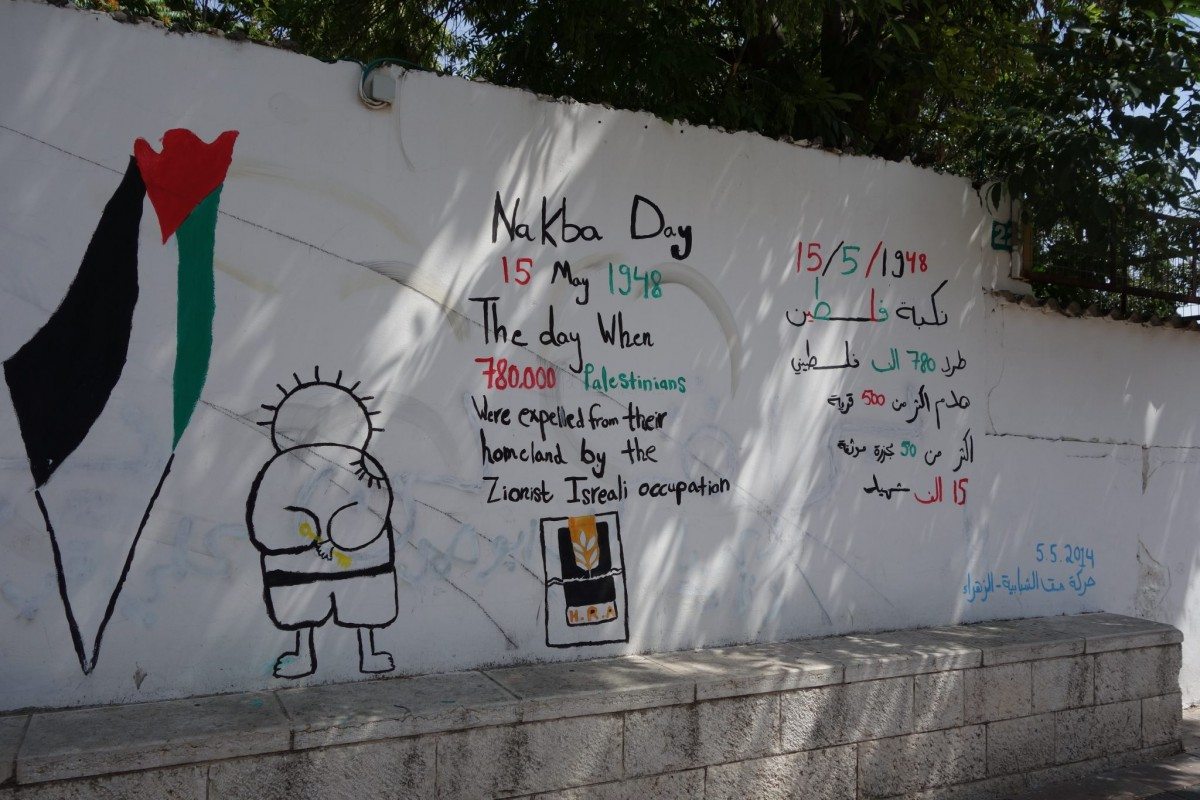
Sites
Al-Ahram Weekly
1948-2002 – The Nakbah continiues (Issue 586, 16-22 May 2002)
Special issue with articles by Ilan Pappe, Salman Abu Sitta, Tikva Honig-Parnas and M Shahid Alam.
1948-1998 (1998)
“Special pages commemorating 50 years of Arab dispossession since the creation of the State of Israel.” Compilation of articles and photographs, and with Chronology.
Counterfire
Nakbha75: the roots of Israeli apartheid (March 2023- ). Series on Palestine.
Deir Yassin Remembered
Deir Yassin Remembered was founded to do justice to the victims of the Deir Yassin Massacre: “Early in the morning of April 9, 1948, commandos of the Irgun (headed by Menachem Begin) and the Stern Gang attacked Deir Yassin, a village with about 750 Palestinian residents … In all over 100 men, women, and children were systematically murdered.”
The Electronic Intifada
Key historical events: Nakba, the Palestinian catastrophe (1948)
With annual commentaries, overview and maps.
Institute for Palestine Studies (IPS)
Theme: 1948 : Sixty three years on …
“To commemorate Al Nakba, the Institute for Palestine Studies has compiled articles from past issues of its flagship Journal of Palestine Studies, and pulled out the carefully constructed maps and chronologies of events from some of its books.”
With Chronology (pdf) (that covers Palestinian history from the first Zionist colony in 1878 to 1948)
Nakba
“Historical accounts of the Nakba, survivors’ testimonies, chronologies and photo galleries.”
See also Nakba eyewitnesses: Narrations of the Palestinian 1948 catastrophe (pdf). By Dheer Ala Abu, edited by Liam Morgan & Allison Morris (An-Najah National University, Nablus-Palestine, 2007, 188 p.).
Plan Dalet and the Nakba
With Maps.
The Official Website of Ilan Pappé
Articles – Interviews – Books – Links.
Palestine Remembered, al-Nakba 1948-
“A comprehensive source of information about about the villages and cities that were ethnically cleansed, looted, and destroyed by the Israeli army.”
Zochrot
“Zochrot carries out different projects to advance understanding of Nakba and Return. This website is one of those projects. The site presents information about the Palestinian localities that Israel destroyed in 1948 and about the Nakba’s place in our lives today.”
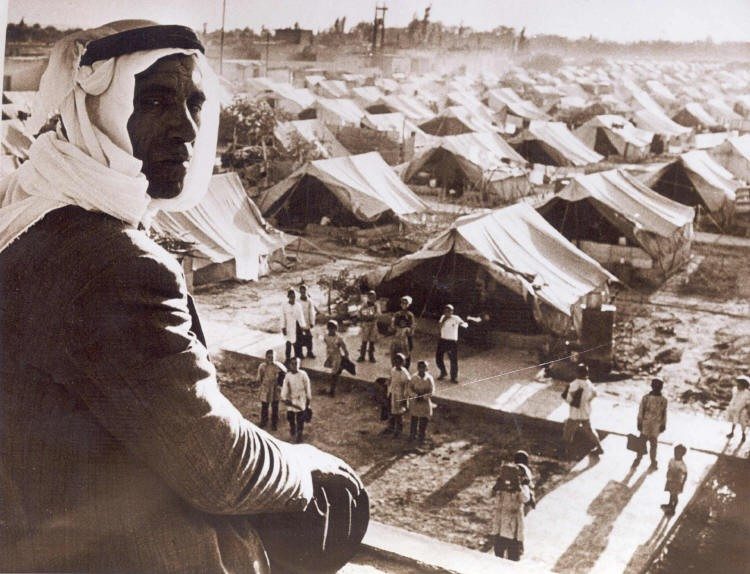
Books in English
The Palestine Nakba: decolonising history, narrating the subaltern, reclaiming memory
By Nur Masalha (Zed Books, 2012, 296 p.)
- Nur-eldeen Masalha (Wikipedia.org)
- Review by Bernard Regan (Red Pepper, June 2012)
See also books below by Nur Masalha (2003 + 1992)
1948: A history of the First Arab-Israeli War
By Benny Morris (Yale University Press, 2008, 544 p.)
“This history of the foundational war in the Arab-Israeli conflict is groundbreaking, objective, and deeply revisionist. A riveting account of the military engagements, it also focuses on the war’s political dimensions. Benny Morris probes the motives and aims of the protagonists on the basis of newly opened Israeli and Western documentation. The Arab side – where the archives are still closed – is illuminated with the help of intelligence and diplomatic materials.”
- Dr. Benny and Mr. Morris: The historian and the twisted politics of expulsion. By Roane Carey (CounterPunch, July 19/20, 2008)
The ethnic cleansing of Palestine
By Ilan Pappe (One World, 2006, 313 p.)
“The renowned Israeli historian revisits the formative period of the State of Israel. Between 1947 and 1949, over 400 Palestinian villages were deliberately destroyed, and civilians were massacred. This book unveils the hidden and systematic ethnic cleansing of the Palestinians in 1948, and its relevance to resolving the conflict.”
Danish edition: Den etniske udrensning af Palæstina (Forlaget Klim, 2012)
- Ethnic cleansing: Palestine reality. Review by Joel Finkel (Against the Current, No.139, March/April 2009)
- Planning the terror that created Israel. Review by Mostafa Omar (International Socialist Review, Issue 57, January-February 2008)
- The 1948 ethnic cleansing of Palestine (pdf). By Ilan Pappé (Journal of Palestine Studies, Autumn 2006, p.6-20)
- Pappe and Israel’s new historians. By Kit Weiner (Against the Current, No.152, May-June 2011)
- Ilan Pappe og bogen ‘Den etniske udrensning af Palæstina’ (Socialistisk Bibliotek)
A history of modern Palestine: One land, two peoples
By Ilan Pappe. Second edition (Cambridge University Press, 2006, 384 p.)
“Ilan Pappe’s book traces the history of Palestine from the Ottomans in the nineteenth century, through the British Mandate, the establishment of the state of Israel in 1948, and the subsequent wars and conflicts which have dominated this troubled region. The second edition of Pappe’s book has been updated to include the dramatic events of the 1990s and the early twenty-first century.”
See the author’s site, with review of the book.
Image and reality of the Israel-Palestine conflict
By Norman Finkelstein. Second edition (Verso, 2003, xxxviii, 287 p.)
First published in 1995, this highly acclaimed study scrutinizes popular and scholarly representations of the Israel-Palestine conflict. It begins with a novel theoretical inter-pretation of Zionism, and then moves on to critically engage the influential studies of Joan Peters, Benny Morris, and Anita Shapira. Carefully rehearsing the documentary record, Finkelstein also challenges the dominant images of the June 1967 and October 1973 Arab-Israeli wars. In a comprehensive new introduction, he provides the most succinct overview available in the English language of the Israel-Palestine conflict …”
See the author’s site + Wikipedia.org.
Chapter 3: ‘Born of war, not by design’ (p.51-87).
A critique of Benny Morris’ books. The chapter is from Journal of Palestine Studies.
See also Norman Finkelstein:
- Myths, old and new (pdf) (Journal of Palestine Studies, Vol.21, No.1, Autumn 1991, p.66-89)
- Rejoinder to Benny Morris (Journal of Palestine Studies, Vol.21, No.2, Winter 1992, p.61-71). Only first page online.
The politics of denial: Israel and the Palestinian refugee problem
By Nur Masalha (Pluto Press, 2003, 304 p.)
“The aim of this book is to analyze Israeli policies towards the Palestinian refugees as they evolved from the 1948 catastrophe (or nakba) to the present. Masalha discusses the 1948 exodus; Israeli resettlement schemes since 1948; Israeli approaches to compensation and restitution of property; Israeli refugee policies towards the internally displaced (‘present absentees’); and Israeli refugee policies during the Madrid and Oslo negotiations.”
The fateful triangle: The United States, Israel, and the Palestinians
By Noam Chomsky. Updated edition (Pluto Press, 1999, 587 p.)
“Since its original publication in 1983, Fateful Triangle has become a classic in the fields of political science and Middle East affairs. This new edition features new chapters and a new introduction by Noam Chomsky and a foreword by Edward Said.”
See especially Chapter 4: Israel and Palestine: Historical backgrounds (pdf) (p.89-322)
All that remains: The Palestinian villages occupied and depopulated by Israel in 1948
Edited by Walid Khalidi (Washington, Institute for Palestine Studies, 1992, 636 p.)
“The culmination of nearly six years of research by more than thirty participants, this authoritative reference work describes in detail the more than 400 Palestinian villages that were destroyed and depopulated by Israeli military forces during the 1948 war.”
- Palestine: Destroyed villages, 1948 (Palestine-Net). Data from the book.
Expulsion of the Palestinians: The concept of ‘Transfer’ in Zionist political thought, 1882-1948
By Nur Masalha (Washington, Institute for Palestine Studies, 1992, 236 p.)
“In this meticulous work, based almost entirely on Hebrew archival material, Nur Masalha examines the Zionist concept of ‘transfer’, or the expulsion of the Palestinian population to neighboring Arab lands. Masalha establishes the extent to which ‘transfer’ was embraced by the highest levels of Zionist leadership, including virtually all the Founding Fathers of the Israeli state.”
- Extract: ‘A miraculous clearing of the land?’: The Zionist concept of ‘Transfer’ and the 1948 Exodus.
- It can be done. Review by Avi Shlaim (London Review of Books, June 1994)
- Så gør vi sådan, når vi flytter et folk… Anmeldelse af Ian Gilmour (Palæstina Orientering, nr.1, marts 1993)
1948 and after: Israel and the Palestinians
By Benny Morris (Oxford University Press, 1990, 284 p.)
“This collections of essays serves as complement to the study The birth of the Palestinian refugee problem, 1947-1949. In part, these essays are based on materials discovered after completing The Birth.”
- 1948 and after; Israel and the Palestinians (Wikipedia.org)
- ‘1948 and After’ revisited. Review essay by Nur Masalha (Journal of Palestine Studies, Summer 1995, p.90-95)
The birth of the Palestinian refugee problem, 1947-49
By Benny Morris (Cambridge University Press, 1989, 380 p.)
“This book is the first full-lenght historical study of the birth of the Palestinian refugee problem. Based on recently declassified Israeli, British and American state and party political papers and on collections of hitherto untapped private papers …”
Debate:
- Roane Carey: Dr. Benny and Mr. Morris: The historian and the twisted politics of expulsion (CounterPunch, July 19/20, 2008)
- Joel Beinin: Forgetfulness for memory: The limits of the new Israeli history (Journal of Palestine Studies, Winter 2005, p.6-23)
- Joel Beinin: No more tears: Benny Morris and the road back from Liberal Zionism (Middle East Report, Issue 230, Spring 2004)
- Walid Khalidi: Why did the Palestinians leave, revisited (Journal of Palestine Studies, Winter 2005, p.42-54)
Debate in Journal of Palestine Studies (Issue 81, Autumn 1991): - Norman Finkelstein: Myths, old and new (pdf) (p.66-89)
- Nur Masalha: A critique of Benny Morris (pdf) (p.90-97)
- Benny Morris: Responses to Finkelstein and Masalha (p.98-114)
- Norman Finkelstein: Rejoinder to Benny Morris (Issue 82, Winter 1992, p.61-71). Only first page online.
Blaming the victims: Spurious scholarship and the Palestinian question
Edited by Edward W. Said and Christopher Hitchens (Verso, 1988/2001, 304 p.)
“Blaming the Victims demonstrates with cold precision how the consistent denial of truth about the Palestinians by governments and the media in the West … Contributors include Norman G. Finkelstein, Peretz Kidron, Noam Chomsky, G. W. Bowerstock, Ibrahim Abu-Loghod, Rashid Khalidi, Janet L. Abu-Lughod, Muhammed Hallaj, and Elia Zureik.”
- Blaming the Victims (Wikipedia.org)
The birth of Israel: Myths and realities
By Simha Flapan (Pantheon, 1987, 277 p.)
“The Israeli author demolishes, based on irrefutable Israeli sources, the seven basic myths upon which an aggressive Israel has depicted itself as the victim of aggression … The most egregious of the seven delusions is that 750,000 Palestinians fled their homes in 1948-1949 in response to calls from their leaders, who asked them to get out of the way temporarily while the Jews were driven into the sea. Flapan poignantly concedes that he, like most Israelis, accepted this and the other six myths as the core of Israel’s self-perception.”
- From the Introduction: Israel’s birth myths (p.8-10)
- The Palestinian Exodus of 1948 (pdf). By Simha Flapan (Journal of Palestine Studies, Summer 1987, p.3-26))
Reviews: - Palestine: The truth about 1948. By Norman Finkelstein (Against the Current, Issue 15, july/august 1988)
- The 1948 Arab invasion of Israel deconstructed. By Ronald Bleier (Lies of Our Times, February 1993)
The Palestinian catastrophe: The 1948 expulsion of a people from their homeland
By Michael Palumbo (Quartet Books, 1987, 233 p.)
“Using newly discovered material from archives in United States, Europe and Israel as well as the documented testimony of the Jewish veterans, Michael Palumbo reveals how the Zionists carried out Ben Gurion’s plan to ‘expel the Arabs and take their place’.”
Chapter 1: Land without a people (p.1-33)
From haven to conquest: Readings in Zionism and the Palestine problem until 1948
Edited by Walid Khalidi (Washington, DC, Institute for Palestine Studies, 1971/1987, 914 p.)
“Now a classic in its field, From Haven to Conquest is a unique Z compendium of difficult-to-obtain or out-of-print material on Zionism and the history of Palestine from ancient times until 1948.”
See Table of contents.
Walid Khalidi: Plan Dalet: Master plan for the conquest of Palestine (pdf) (Vol.18, No.1, Autumn 1988, p.4-33)
Video
YouTube.com
Deir Yassin Massacre 1948. (YouTube.com, 1.18 min)
Al-Nakba. Dokumentarfilm af Rawan Damen (TV Al Jazeera, 2009; på Youtube.com). 5 dele, ca. 4-7 min., engelsk tale, italienske undertekster. (Docu by Rawan Damen, 5 parts, in English, italian subtitles)
















